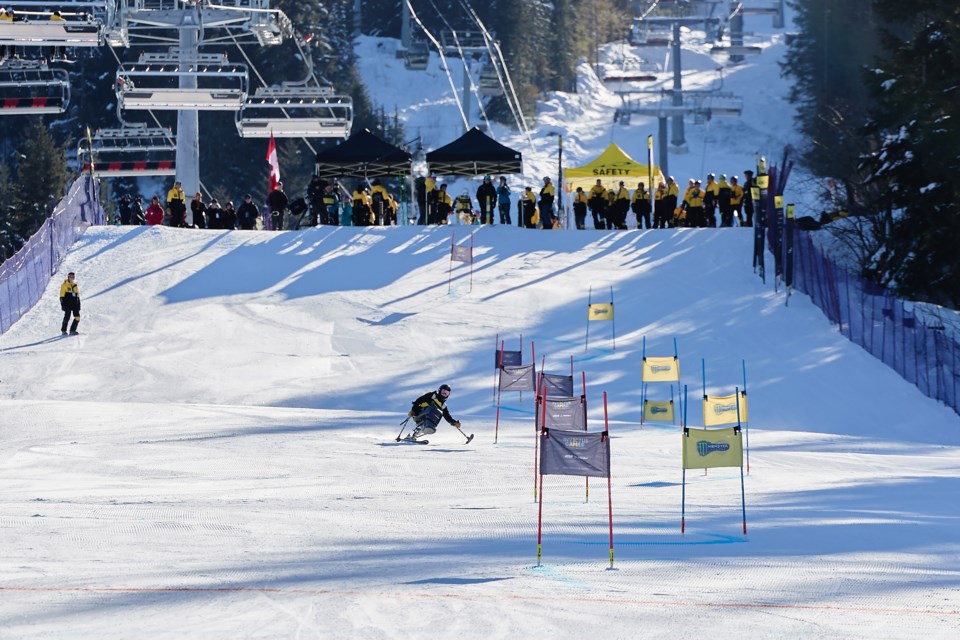The Invictus Games not only brought hundreds of military veterans, their families and coaches from around the globe to Whistler for the very first winter edition of the adaptive sporting event, it also generated approximately 1,000 hotel room nights and a flurry of media attention, according to Tourism Whistler.
“I think similar to the Olympic Games—certainly on a different scale—the Invictus Games really put Whistler in the spotlight as part of that Vancouver-Whistler collaborative,” said Tourism Whistler president and CEO Barrett Fisher.
Founded by Prince Harry, the Duke of Sussex, the Invictus Games held its first hybrid event from Feb. 8 to 16, with Whistler hosting winter sports such as alpine skiing and snowboarding, Nordic cross-country skiing, skeleton, and biathlon, and Vancouver hosting summer sports. More than 500 veterans from 23 countries participated.
The event provided a welcome injection of visitors at a time when travel from Whistler’s historical international destinations is down somewhat from last year, itself following a holiday period that was sluggish for certain sectors.
“Overall, our survey data indicated that separate and distinct from the families, the competitors, the sponsors and staff of Invictus, we probably had around 1,500 visitors attend Invictus specifically to come to the event,” Fisher relayed. “That probably generated somewhere around 1,000 room nights, and that would be incremental to our typical ski and snowboard visitor who would be coming in that February timeframe.”
Notably, the majority of athletes competing in Whistler were bused up from Vancouver and back after their event completed.
“The reason for that is because Vancouver in February would be considered their downtime, whereas Whistler in February is considered our high season,” explained Fisher.
There was at least one notable exception, however: Sixty-eight athletes from the Australian national team decided to stay two nights in Whistler rather than head back to Vancouver to “immerse in the winter experience,” Fisher said.
Tourism Whistler is planning an upcoming study in conjunction with Invictus and Sport Tourism Canada to better understand the Games’ economic impact.
With the boost Invictus provided, Whistler’s hotel room night bookings were pacing “similar” to the same period last year, Fisher said.
But an event of such magnitude attracts more than just heads in beds. Along with the media attention sparked by high-profile appearances from the likes of Prince Harry and his wife, Meghan Markle, the Duchess of Sussex, pop crooner Michael Buble, and performances by Canadian music icons Barney Bentall and Jim Cuddy, roughly 300 media covered the event, with about half of those coming to the resort.
“It gave us an opportunity to meet with some of the media here from all over the world and to share Whistler’s story with them as well,” said Fisher.
Invictus, and the flurry of accessibility improvements that came with it, should also help improve Whistler’s reputation as a destination for adaptive athletes, veterans, and anyone else with accessibility needs.
“All of these things, when you look at the ramps through the village, when you look at accessible rooms and washrooms … it really shows how Whistler is becoming more and more of a destination to welcome all,” said Fisher, who added the Myrtle Philip Community Centre, the Maury Young Arts Centre, and The Roundhouse Lodge on Whistler Mountain have all been submitted for Rick Hansen Association accessibility certification after recent upgrades.
Looking at the Family Day and U.S. Presidents Day long weekend, Fisher said “we are seeing real strength coming from our U.S. visitor market, which, from our perspective, is very positive and encouraging despite what may be going on in politics.”
Canada-U.S. relations have been thrown into disarray since the election of U.S. President Donald Trump, who has strained the nations’ longstanding alliance with threats of overtaking Canada and implementing hefty tariffs on imports.
“The American people are not responsible for some of the political challenges going on, so we do really want to rise above that and continue to welcome our American visitors,” Fisher said. “Canada has historically been known as an incredibly welcoming destination and a kind, friendly people, and so we would like to continue that momentum.”




